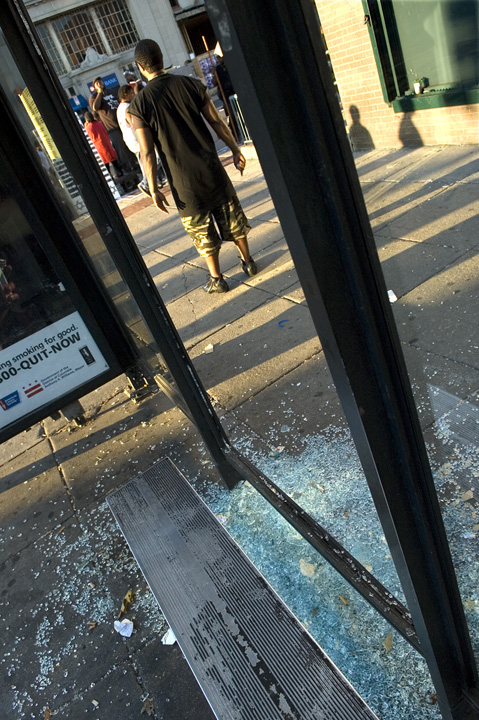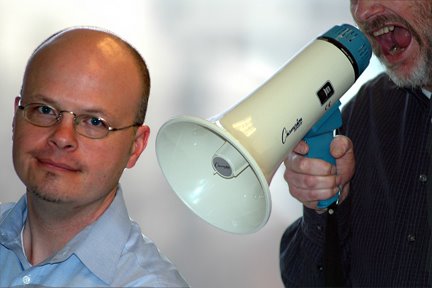Shattered Glass, Shattered Peace
 (CLICK TO ENLARGE) Glass shards from a shattered bus shelter litter the ground and bench while an amplified group disturbs and disrupts the residents and businesses in and around H and 8th Street NE. The photo was made on Saturday, Aug. 12, 2006. The familiar scene also happened in June, and one man berated my wife and me for cleaning up the broken glass. (Copyright © 2006. David Klavitter)
(CLICK TO ENLARGE) Glass shards from a shattered bus shelter litter the ground and bench while an amplified group disturbs and disrupts the residents and businesses in and around H and 8th Street NE. The photo was made on Saturday, Aug. 12, 2006. The familiar scene also happened in June, and one man berated my wife and me for cleaning up the broken glass. (Copyright © 2006. David Klavitter)Four bus stops—for the east-west X2 and X1 lines and the north-south 90, 92, and 93 lines—populate the confluence of H and 8th Streets NE. Three woefully inadequate shelters offer to waiting passengers refuge from the sun, wind and rain. About once a month, someone smashes one of the large glass plates lining the shelters.
Designed for safety, the glass disintegrates into thousands of tiny—yet sharp—pieces. Unless someone calls the city or the Metro Transit Authority, the debris lingers for at least a day. On my way to catch a bus early one Saturday morning in late June, I encountered yet another pile of broken glass, which spread out in all directions. It was as if the plate glass fell backward out of its moorings and smashed onto the concrete.
Glass crunched underfoot as I passed. I telephoned Metro while I waited for the westbound X2. As always, there is confusion about which shelters are maintained by Metro (the bubble-topped ones) or the city (flat-topped ones). Since the damaged shelter had a flat roof, the operator said she would notify the city.
When I returned home nine hours later, the mess remained. People crowded the bus stop. Children wearing flip-flops and sandals played and chased each other, while their parents gazed north in the afternoon heat, watching for the southbound bus. Frustrated, I called the city again, and then went out to the southeast corner to document the usual noisemakers. I returned home in an hour.
No city or Metro cleanup crews. Broken glass. Kids running around. Finally, my wife, Kara, and I grabbed two brooms, a dustpan and garbage can; we marched the 50 steps to the bus stop. We started sweeping. Almost immediately a man, apparently waiting for the bus, stormed up to us and started shouting.
“What the fuck do you think you’re doing?” he screamed among the other adults and children. “This isn’t your neighborhood! You crackers should go back to where you came from!”
Kara and I were taken aback. Instantly I recognized him as a frequent listener to the amplified rants of the Israeli School of Universal Practical Knowledge (ISUPK), the group at that moment still using their amplifier to blast the neighborhood with racial and homophobic diatribes. He appeared completely pissed—almost threatening—and kept screaming. People stared. Then my anger boiled over.
“Fuck you!” I yelled. “We live here, too!” I gestured to the children gathered at the bus stop. “This broken glass has been here since this morning and the city hasn’t responded and these kids are running around in sandals and we just want to clean it up!” I could feel the words pour out of my mouth, and soon was aware that the assembled kids were getting quite an earful of the word “fuck.”
Suddenly my shaking voice wasn’t alone. Mothers and grandmothers came to our rescue. They yelled at the man to shut up and to think about the children, while two men stepped in between the upset man and us.
Soon the angry dude’s friend pulled him away from us. The two men who had stepped in between offered to help. They grabbed one broom from my hand to help Kara sweep and the other maneuvered the garbage can while I scooped up the piles of glass with the dustpan. Together we made quick work of clearing glass shards from the sidewalk.
A southbound bus hissed to a stop and most of the waiting people—including the angry fellow—boarded. The two men who had helped us stayed behind. The bus pulled away from the curb.
“Thank you,” I said to the men.
“We’re all human beings,” one of the men replied as we shook hands. “Yes,” I said. “All human beings.”
Kara and I lugged home our heavy garbage can. We went inside, followed by the angry, amplified ranting still audible from the corner. We collapsed on the couch and looked at each other: On one June afternoon at H and 8th Streets NE, we had experienced within minutes two sides of humanity—one extremely ugly and the other utterly beautiful. We cried.


9 Comments:
My god, Klav, so sorry you had to go through that.
Hey Dave! Remember me? Ellen Boynton. Madison. Anyway... I came across your blog a couple of weeks ago and I've checked in once in awhile. I love the fact that you're doing this!
This entry was particularly moving, so I had to write to say "Hi". Keep up the good fight!
"...berated my wife and ME"
Time to get a new editor, Anon. Changed "I" to "me..."
Of course, I remember you, Ellen! One of my favorite people from my life's Madison, Wis., chapter. I'll drop you a line on your blog.
I am a frequent reader of your blog and I have to say that this is one the best. I live on 1200 block of 16th Street NE and I we have some similar problems there also. You and your wife did the right thing by cleaning up the glass. It not only removed the danger to the kids and the community, but it also enabled you to meet some kind people. I often clean up trash and glass on my street and I am surprised when others just come out of nowhere to help.
I believe in Broken Windows Theory and this what is going on at the bus stops. They are hoping that the broken glass and debris will deter you from coming out of your house and will scare you away. H St will only continue to get better if all of its neighbors and residents come out and help.
Thanks, Anon...
All residents and business in and around H and 8th NE work together to make the community safe and clean for everyone...
Your story is a testament to you and your wife's courage. It is difficult to stand up to blind hatred. Especially, when you don't know if the peple around you will support you or not. But you did stand up, and your courage lead other people to stand up with you!
I live on 1010 G Street NE, just a couple of blocks away from where the speeches are made, and you should know that there are a lot of us willing to help you combat hate!
Barbosa:
Thanks for your thoughts, neighbor. The council’s failure to fix the flawed statute allows bullhorned bullies to dominate the free marketplace of ideas.
Citizens from all walks of life have a right to speak, debate, argue, and be heard. More conversation--not one sided blaring--is necessary to foster understanding.
Klav
Post a Comment
<< Home